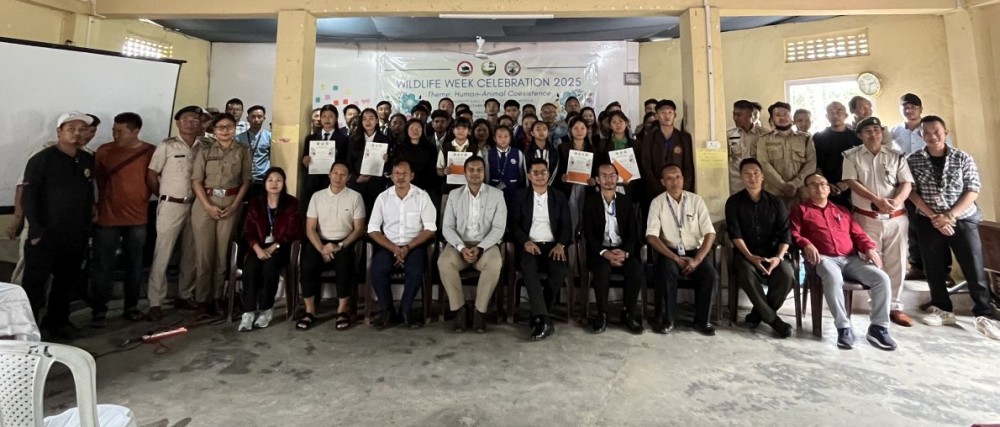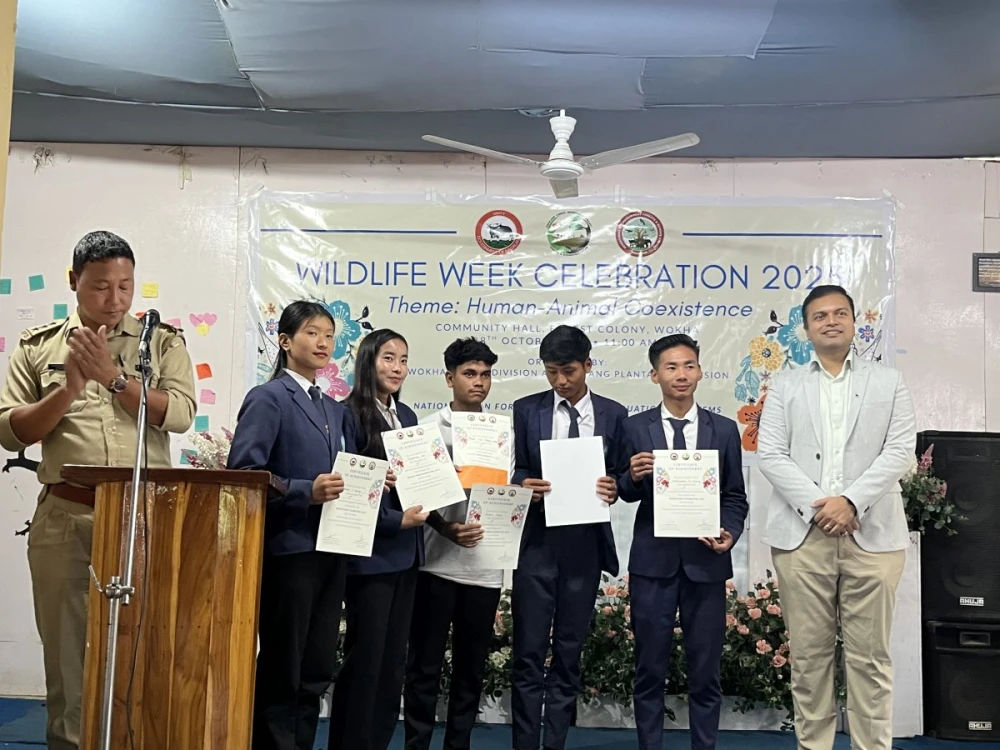Wildlife Week 2025 event was held at the community hall, Forest Colony, Wokha on October 8.

Morung Express News
Wokha | October 8
The traditional elephant corridors between Wokha in Nagaland and Assam have been disrupted due to human activities like encroachment, farming and infrastructure development, a senior forest official said on October 8.
Suman WM Sivachar, IFS, Divisional Forest Officer (DFO) of Wokha Forest Division and Doyang Plantation Division, highlighted this as a primary cause of human-animal conflict in the region during the Wildlife Week 2025 event held under the theme ‘Human-Animal Coexistence’ at the Community Hall, Forest Colony, Wokha.
“When natural habitats shrink, animals spill over into human habitations, leading to conflicts,” Sivachar said, addressing the gathering at the community hall, Forest Colony, Wokha. The event was organised under the theme ‘Human-Animal Coexistence’ by Wokha Forest Division and Doyang Plantation Division. It was attended by officials including Sangthing Khiam, Wokha SDPO, and representatives from the Lotha Hoho.
Sivachar highlighted that humans and animals have coexisted since time immemorial not only with wildlife but also with domesticated animals that provide companionship, food and other essentials.
He explained that Nagaland lies at the confluence of two biodiversity hotspots, the Himalaya and Indo-Burma regions, making it one of the richest states in terms of flora and fauna diversity. He cited unique species such as the Malayan Sun Bear, Himalayan Black Bear, and the Blyth’s Tragopan, Nagaland’s state bird, which are distinctly found in the region.
He further explained elephants’ superior memory and traditional migratory routes, which contribute to recurring human-elephant conflicts in the region.

Sivachar also spoke on the need for sustainable coexistence, urging communities to adopt the role of eco-warriors instead of hunters, citing that Nagaland’s forest cover about 79% of its land area is primarily community-owned. “The Earth and its resources do not belong to us permanently, we are merely custodians for future generations,” he reminded.
He reflected on the lessons from the COVID-19 pandemic, noting that nature’s resilience demonstrated how quickly it can recover when human activity slows down. “It is sheer arrogance for humans to think we can overshadow nature”.
In his welcome address, Elithung B Odyuo, Assistant Conservator of Forests (I/c Merapani Range & Liphayan Beat), emphasised the importance of understanding and appreciating nature rather than taking it for granted. He reminded that every species from the tiniest insect to the mightiest elephant plays a vital role in maintaining ecological balance.
“Coexistence should not merely be an idea but a necessity,” he stated, adding that the survival of wildlife ensures the survival of humanity. He encouraged the gathering to cultivate awareness, empathy, and action to build a world where both humans and animals can live freely and safely.
The programme was attended Sangthing Khiam, Wokha SDPO and Lotha Hoho.
As part of the celebration, the division organised debate, extempore speech, and painting competitions among students from various educational institutions.
The results of the competitions were declared by Longshithung Ovung, Deputy Range Forest Officer attached to Liphayan Beat.
The programme was chaired by Olivi Awomi, Range Forest Officer, Baghty Range, with the opening prayer led by Alemyanger, Deputy Range Forest Officer, Doyang Afforestation Range followed by a vote of thanks delivered by Karlemba, Deputy Range Forest Officer, Champang Beat.
WINNERS
Extempore speech: 1st – Zuyani R. Humtsoe, Isaiah Ability Higher Secondary School; 2nd – Rhonthunglo Lotha, Government Higher Secondary School, Wokha.
Debate: Mount Tiyi College.
Painting Category (Classes 1–4): 1st – Lissenroni Ngullie, Perennial School; 2nd – Fuchumo N Ngullie, Perennial School.
Category (Classes 5–8): 1st – Samlamngaule Lungalaing, Don Bosco Higher Secondary School; 2nd – Dipsika Lepcha, Fernbrook School.
Category (Classes 9–12): 1st – M Bidemo Lotha, Perennial School; 2nd – Z. Martha Ezung, Government Higher Secondary School, Wokha.






